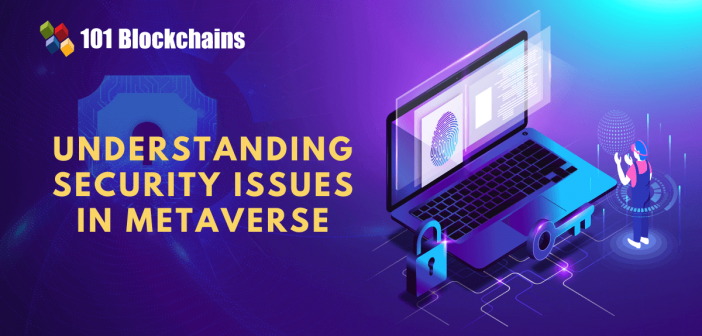Learn how blockchain truly works, master key definitions, and uncover what makes smart contracts so "smart." Dive into the fundamentals, gain valuable insights, and start your blockchain journey today!

Metaverse
James Howell
on February 23, 2022
3 Metaverse Security Issues that you must know
Want to know if there is any security concern associated with Metaverse? Check out our guide on the common metaverse security issues you should know about.
The metaverse has been a popular concept in discussion across various tech news platforms in recent times. There is no way one could have missed out on the buzz around the metaverse, which has escalated in the last few months. Many of you may assume that the metaverse is a new term even if it has been around since 1992. The metaverse brings the assurance of an open, shared, and persistent digital environment that connects communities, products, solutions, creators, entertainment, workspaces, commerce, and many other aspects of the real world.
However, the metaverse security issues also play a crucial role in the dynamics of the metaverse space. While many enterprises are wondering about the possibilities with the metaverse, it is reasonable to think of potential concerns associated with it. What are the most notable privacy and security concerns associated with the metaverse? The following discussion helps you explore some relevant answers.
Should People Worry about Metaverse Security Risks?
Facebook changed its name to Meta and created a massive surge in discussions about the metaverse. While the prospects for a fully operational metaverse might be a few years away from now, the preparations for building the metaverse are well underway. We are practically much closer to the immersive experiences in the virtual environments of metaverse than one could possibly imagine. How? The sale of VR headsets has been growing profoundly in recent times. Estimates suggest that the number of total VR headset units sold would surpass the mark of 34 million by the year 2024.
On the other hand, developments in the blockchain and crypto space with the introduction of more efficient and scalable blockchain networks present prolific opportunities for the growth of the metaverse. Amidst all the developments in the metaverse space, the metaverse security concerns also play a crucial role in defining the future metaverse roadmap.
Want to get an in-depth understanding of metaverse concepts? Enroll in Metaverse Fundamentals Course Now!
Security and Privacy Risks in the Metaverse
Just like every other new technology, the metaverse also has its fair share of setbacks in terms of metaverse challenges for security and privacy. The metaverse promises a new paradigm for combining social and technology experiences with unparalleled levels of interoperability and immersive experiences. However, the interoperability and immersive experiences also have a flip side.
The technologies used to power up metaverse platforms have some prominent risks of their own. The two most popular technologies driving the metaverse are AR and VR, which offer the interface for the metaverse. On the other hand, the security and privacy concerns associated with these technologies can rub over the metaverse.
Let us take a look at three of the prominent metaverse security risks with an understanding of how they evolve from metaverse technologies.
Security Risks of Augmented Reality
Augmented Reality or AR is one of the founding pillars of the metaverse and new AR developments is undoubtedly exciting. New AR advancements can provide new instruments and approaches for collecting data. At the same time, augmented reality also offers many new opportunities for transforming connections between the real and virtual worlds. However, AR is responsible for many prominent metaverse security risks, especially pertaining to the privacy of users. The following questions can help you reflect on the possibilities of security risks in the metaverse through augmented reality.
- What happens to user privacy if hackers compromise an AR device?
- How will AR firms use and safeguard the data collected from users?
- Where do businesses store AR data and what are the encryption methods followed for the same?
- Do the AR companies share AR data with third parties and for what purposes?
All these questions point out the metaverse blockchain security issues such as social engineering attacks, credential theft, and denial of service. Here is a brief overview of the prominent privacy risks in the metaverse evolving from AR technology.
-
Social Engineering Attacks
Anyone could prove their identity in the real world with relevant documents. However, users in the metaverse must validate voice, video recordings, and facial features by using digital avatars. People interact with each other and the metaverse through AR and VR devices. Hackers can trick people into revealing their personal information by using social engineering techniques or identity theft tricks.
-
Credential Theft
Identifying theft is one of the biggest metaverse challenges you can come across right now. Anyone with access to your network credentials could easily assume your identity in the metaverse. Hackers or criminals can compromise the network credentials of users through wearable gadgets. As a matter of fact, hacking is one of the critical concerns for retailers using shopping apps based on VR and AR technologies. Theft of network credentials can also compromise the financial and personal information of users stored in their user profiles on the metaverse.
Learn about the fundamentals, key elements and business opportunities of the metaverse technology through this Metaverse E-book: An Introduction To Metaverse
Security Risks of Virtual Reality
If you thought that AR is the only culprit for metaverse security issues, then you might want to think again. Virtual Reality or VR is also responsible for many notable privacy issues in the metaverse. What makes VR a vulnerable target in the metaverse? Data obtained by VR technology such as biometric data in fingerprints, retina scans, voiceprints, and facial geometry lead to many privacy concerns with virtual reality.
The most prominent privacy risks associated with the metaverse due to VR technologies include ransomware, identity theft, and loss of human connection. Here is an overview of the prominent metaverse security concerns emerging from virtual reality.
-
Identity Theft
VR technologies powering the metaverse serve as a vulnerable target for identity theft in the metaverse. Various machine learning algorithms can easily help in manipulating sounds and visuals to an extent where they seem authentic. For example, think of a situation where hackers have gained access to the motion-tracking data of a VR headset. Now, the hackers could easily generate digital duplicates by leveraging the motion-tracking data from VR headsets. Subsequently, hackers can use the digital duplicates in overlap with another individual’s VR experience to carry out social engineering attacks.
-
Ransomware
The next prominent entry among metaverse security risks due to VR is ransomware. For example, hackers could probably insert functionalities in VR platforms that deceive users into revealing their personal information. Just like the social engineering attacks with AR, hackers can use VR vulnerabilities in the metaverse for ransomware attacks. Hostile agents could easily compromise VR devices used for accessing the metaverse and subsequently, the metaverse experience of users.
-
Reduced Perception of Physical Space
Another formidable entry among metaverse challenges beyond the scope of privacy is the loss of connection with the real world. The immersive and highly engaging experiences in the metaverse facilitated by VR technologies serve as a prominent highlight for the popularity of the metaverse. However, VR also cuts off an individual from the real world for a specific period of time. Users immersed in VR experiences do not have any audio-visual connection with the real world. As a result, the security issues in metaverse due to VR also extend to the concerns of physical security in the user’s environment. Users should always have a strong awareness of their surroundings to avoid any physical security issues in the metaverse.
Polarization and Radicalization
The final and most important entry among metaverse blockchain security issues would point to possibilities of polarization and radicalization in the metaverse. The privacy and security risks in the metaverse discussed till now are associated with setbacks in technologies powering the metaverse.
However, the security risks of polarization and radicalization in the metaverse emerge from the basic concept of a shared universe. The metaverse is undoubtedly a massive platform for aggregating different applications, assets, services, and users. The success of the metaverse depends largely on its capabilities for serving as a centralized access point for all resources.
If you look at the existing structure of the web, you would find a completely different picture. You have multiple platforms, some of which are massive and popular while some are fringe and small-scale. In such a structure, each user can discover a unique community or online platform with users sharing the same interests and preferences.
However, the metaverse envisions simultaneous coexistence and presence in a shared and persistent virtual space. The merging of radically different and possibly opposing user groups can lead to severe metaverse security concerns. For example, many MMORPG gaming environments have shown instances of cyber-bullying of female players and low-skilled players.
Every individual has unique traits and behaves differently in the real world. So, it is most likely that they would mirror the same traits in the virtual worlds of the metaverse. Some users may find ways for exploiting the way a particular user behaves in the metaverse. Therefore, the security and privacy risks due to trolling and harassing on the metaverse emerge from polarization and radical behavior in the metaverse.
Build your identity as a certified blockchain expert with 101 Blockchains’ Blockchain Certifications designed to provide enhanced career prospects.
Bottom Line
The overview of different metaverse security risks shows the unexplored side of the metaverse. Many of us have been quick to assume that metaverse is obviously secure from security and privacy threats due to blockchain. However, the metaverse is not all about blockchain technology only. AR and VR technologies powering the metaverse can also lead to many privacy and security concerns such as network credential theft, identity theft, social engineering attacks, and ransomware attacks. Hackers could exploit the vulnerabilities in AR and VR devices for misusing the identity of a specific user in the metaverse. On top of it, the metaverse also presents concerns for physical security due to the loss of audio-visual connection with the real world. Most important of all, the metaverse presents another notable security and privacy concern in the form of polarization and radicalization. Dive deeper into the world of metaverse to learn more about its security concerns.
*Disclaimer: The article should not be taken as, and is not intended to provide any investment advice. Claims made in this article do not constitute investment advice and should not be taken as such. 101 Blockchains shall not be responsible for any loss sustained by any person who relies on this article. Do your own research!








